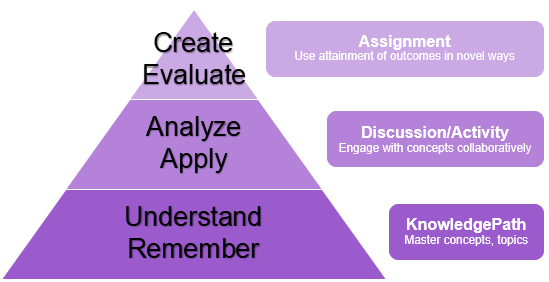KnowledgePath: A New Model for Teaching and Learning
What Does KnowldgePath (KP) Do?
KnowledgePath (KP) is a key component of SOUL that modifies the content, presentation, and pace of learning and teaching based on each student’s performance and preference. We thought you might gain even more perspective into your important role as part of the team delivering this unique model we call SOUL by reviewing the following article written by two members of the TAWC leadership team.
Journey to Adaptive Learning at The American Women’s College [1]
For faculty teaching a course in our adaptive platform, additional resources will be made available prior to the start of your course. These resources review all of the pertinent information you’ll need to effectively navigate the system and leverage the data provided for your class.
Here are ways the adaptive system automatically responds to the student:
- Each activity in KP may have multiple representations – text, video, audio, or interactive exercise – depending on how the course was designed. Each representation of learning content is meant to be interchangeable and to cover the same basic topic. The version a student sees is determined by her past performance with similar content, her current mastery levels, and her stated preference for content-type. In this way, KP uses Universal Design for Learning principles.
- Each KP assignment features a pretest to gauge students’ prior knowledge levels. Those who display mastery are able to work ahead in their learning. Struggling students, on the other hand, revisit content and can choose to see an alternative version of the content until they achieve mastery.
- The clear depiction of the mastery level also encourages our students to engage in metacognition by actively reflecting on how they are learning and achieving. They are thus empowered by the language built into their learning maps to reach out to their instructors for support on very specific topics.
What is your role in KP?
Your role in a KP course is different from teaching in a traditional online course. In a traditional online course, it is difficult to know which of the dozens of topics students had mastered in a given week. Instructors also would not have a sense of students’ mastery until they engaged in weekly summative assignments due at the end of the week. Even then, instructors might wonder when or where a student may have benefited from help earlier in the week during the students’ learning processes.
KP empowers you to be a more effective educator who responds rapidly and in a more focused manner than ever before. Adaptive learning clarifies the sources of students’ struggles and which students have done the reading or not. Visuals in the KP system will position you to see very specific data about:
- How each student is performing on each and every topic in your course
- Who may need your assistance
- Who may be lagging behind schedule
- Who is working ahead of the curve
These teaching benefits of the KP system are predicated upon your accessing the system on a regular basis and conducting proactive interventions with your students. Remember: you no longer need to wait for a student to tell you she’s struggling; you’ll see it right when she does and you’ll know exactly how to help!
This blog post written by Jeremy Anderson, Vice President of Learning Innovation, Analytics, & Technology, explores common questions and assumptions for adaptive learning:
Busting the Top 5 Myths about Adaptive Learning. [2]
How does KP relate to the rest of your course?
Many of our courses include KP, though not all do. If a course does have a KP component, typically there will be a KP assignment in each module. This adaptive assignment is meant to cover the foundational knowledge for the module, so it leads students to greater success on discussion posts and culminating assignments. You should encourage students to complete the KP assignment early in the module since its content is necessary to finish other work.

- Anderson, J. & Bushey, H. (2017 June 19). Journey to adaptive learning at The American Women's College. EDUCAUSE Review. https://er.educause.edu/articles/2017/6/journey-to-adaptive-learning-at-the-american-womens-college ↵
- Anderson, J. (2019). Busting the top 5 myths about adaptive learning. Realizeit. ↵